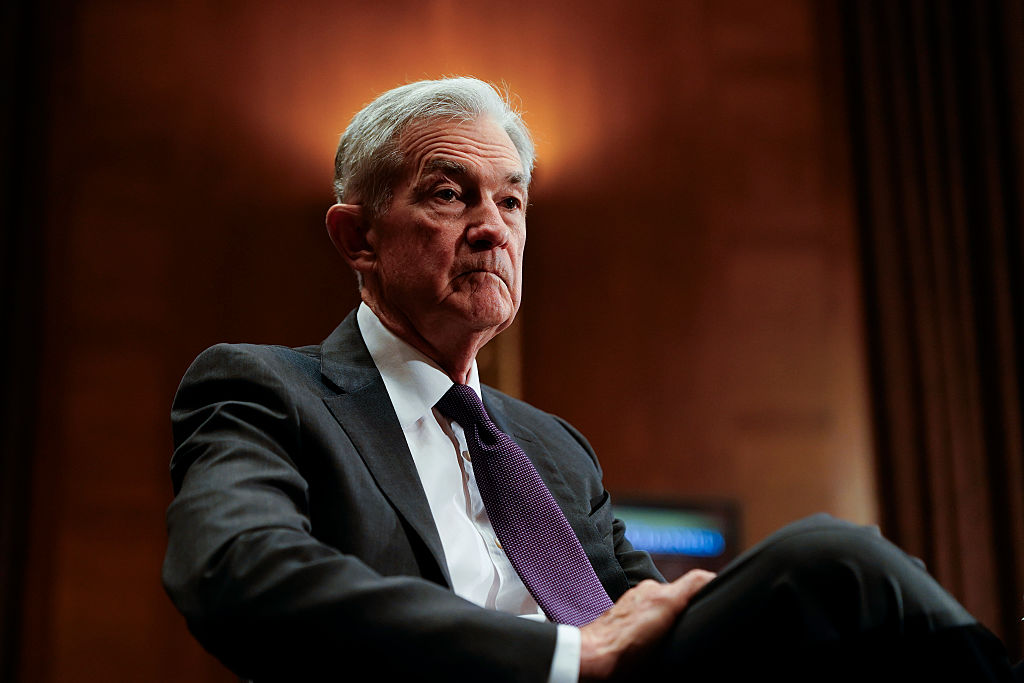Should investors be worried about stagflation?
The latest US employment data has raised the ugly spectre of “stagflation” – weak growth and high inflation. John Stepek looks at what’s going on and asks if you should be worried.


Get the latest financial news, insights and expert analysis from our award-winning MoneyWeek team, to help you understand what really matters when it comes to your finances.
You are now subscribed
Your newsletter sign-up was successful
Want to add more newsletters?

Twice daily
MoneyWeek
Get the latest financial news, insights and expert analysis from our award-winning MoneyWeek team, to help you understand what really matters when it comes to your finances.

Four times a week
Look After My Bills
Sign up to our free money-saving newsletter, filled with the latest news and expert advice to help you find the best tips and deals for managing your bills. Start saving today!
One of the least pleasant economic environments for investors is that of “stagflation”.
Growth remains weak, so it’s hard for companies to earn money. But inflationary pressures stay high, so margins are squeezed and monetary policy stays tight.
The latest US jobs data has some commentators already reaching for the “s” word.
MoneyWeek
Subscribe to MoneyWeek today and get your first six magazine issues absolutely FREE

Sign up to Money Morning
Don't miss the latest investment and personal finances news, market analysis, plus money-saving tips with our free twice-daily newsletter
Don't miss the latest investment and personal finances news, market analysis, plus money-saving tips with our free twice-daily newsletter
Are they right to be worried?
The US jobs data springs a nasty surprise
The latest jobs data in the US showed its economy added 235,000 jobs in August.
That was a big disappointment. In normal times, that’d be a huge number, but we’re not in normal times. We’re meant to be recovering from a big economic shutdown and we’re hearing about labour shortages across the board. So markets had expected the figure to come in at more like 730,000.
Needless to say, that’s a big miss.
We shouldn’t necessarily jump to conclusions. There are lots of reasons why this might have happened.
Most obviously, the last 18 months have been really weird. You can’t expect statistical series – even long-running ones – to be as reliable as usual at times like these. This data is full of estimates, guesstimates and assumptions.
Even at the best of times, the non-farm payrolls data is very prone to revision. I’ve commented here before on how ridiculous it is that the market takes it so seriously. A big miss or a big gain can drive big swings in the market – and then a month later, the figure can be revised to show the exact opposite.
Indeed, the gains for July were revised up to 1.05 million from an already very strong number.
However, if the data is relatively accurate, then what does it suggest? Most analysts reckon that the big issue is the Delta variant of the coronavirus.
As Paul Ashworth of Capital Economics points out, Delta may not just be scaring off customers, it may be putting people off returning to the labour force as well. “Close to three million [potential workers] are still missing compared with the pre-pandemic level.”
Yet at the same time, wage inflation remained strong. Despite the weak reading for actual job numbers, wages rose more strongly than expected, up by 0.6% month-on-month, and 4.3% year-on-year (accelerating from 4.1% previously).
As Ashworth adds, this puts the Federal Reserve – the US central bank – “in an uncomfortable position – with the slump in the real economy and employment growth accompanied by signs of ever more upward pressure on wages and prices.”
From an investor’s point of view, there are two things that matter here. One is that every weak piece of data gives the Federal Reserve another excuse to delay normalising monetary policy. At the Jackson Hole conference the other week, Fed chairman Jerome Powell stuck with the story that the US central bank will start to “taper” by the end of this year, perhaps announcing it as soon as this month.
However he also emphasised the importance of the Fed’s employment target. So if the data implies that we’re further away from “full employment”, then the Fed is not going to be keen to rock the boat by being overly aggressive on tightening. I suspect that the wage data won’t matter as much to Powell and colleagues as overall employment levels.
You can see this thinking in the initial reaction to the weak data. The US dollar was a little weaker, gold was a bit stronger, and stocks ambled about a bit before deciding they weren’t too bothered.
Are we heading for stagflation again?
The second thing to keep an eye on is what this says about the economic recovery. We’re already starting to see “stagflation” headlines cropping up all over the place. This disappointing jobs report has only added to that concern.
Stagflation is a toxic mix of weak growth and high inflation – similar to what we saw in the 1970s. That’s not a decade that any investor particularly wants to repeat.
It’s understandable why this is a concern. The “misery index” – which just involves adding the unemployment rate to the inflation rate – is extremely high relative to recent decades, what with unemployment remaining above pre-pandemic levels and inflation picking up sharply.
In my view, it’s probably a little early to worry about stagflation. I am quite sure that inflation is going to become a longer-term issue and won’t be “transitory”. What I’m less concerned about right now is growth.
Delta has knocked back progress on lots of fronts, and supply chains are a particular issue right now. But there’s still a lot of demand out there (otherwise wages wouldn’t be going up). And you would hope that, as a result, unemployment will fall – there’s certainly plenty of demand for labour out there.
So I wouldn’t be worrying about stagflation quite yet. But it’s certainly worth keeping an open mind.
We’ll be discussing the topic in more detail in a forthcoming issue of MoneyWeek magazine. Get your first six issues free here if you haven’t already subscribed.
Until tomorrow,
John Stepek
Executive editor, MoneyWeek
Get the latest financial news, insights and expert analysis from our award-winning MoneyWeek team, to help you understand what really matters when it comes to your finances.

-
 Early signs of the AI apocalypse?
Early signs of the AI apocalypse?Uncertainty is rife as investors question what the impact of AI will be.
-
 Reach for the stars to boost Britain's space industry
Reach for the stars to boost Britain's space industryopinion We can’t afford to neglect Britain's space industry. Unfortunately, the government is taking completely the wrong approach, says Matthew Lynn
-
 How a dovish Federal Reserve could affect you
How a dovish Federal Reserve could affect youTrump’s pick for the US Federal Reserve is not so much of a yes-man as his rival, but interest rates will still come down quickly, says Cris Sholto Heaton
-
 New Federal Reserve chair Kevin Warsh has his work cut out
New Federal Reserve chair Kevin Warsh has his work cut outOpinion Kevin Warsh must make it clear that he, not Trump, is in charge at the Fed. If he doesn't, the US dollar and Treasury bills sell-off will start all over again
-
 'Investors should brace for Trump’s great inflation'
'Investors should brace for Trump’s great inflation'Opinion Donald Trump's actions against Federal Reserve chair Jerome Powell will likely stoke rising prices. Investors should prepare for the worst, says Matthew Lynn
-
 'Governments are launching an assault on the independence of central banks'
'Governments are launching an assault on the independence of central banks'Opinion Say goodbye to the era of central bank orthodoxy and hello to the new era of central bank dependency, says Jeremy McKeown
-
 Will Donald Trump sack Jerome Powell, the Federal Reserve chief?
Will Donald Trump sack Jerome Powell, the Federal Reserve chief?It seems clear that Trump would like to sack Jerome Powell if he could only find a constitutional cause. Why, and what would it mean for financial markets?
-
 Can Donald Trump fire Jay Powell – and what do his threats mean for investors?
Can Donald Trump fire Jay Powell – and what do his threats mean for investors?Donald Trump has been vocal in his criticism of Jerome "Jay" Powell, chairman of the Federal Reserve. What do his threats to fire him mean for markets and investors?
-
 Do we need central banks, or is it time to privatise money?
Do we need central banks, or is it time to privatise money?Analysis Free banking is one alternative to central banks, but would switching to a radical new system be worth the risk?
-
 Will turmoil in the Middle East trigger inflation?
Will turmoil in the Middle East trigger inflation?The risk of an escalating Middle East crisis continues to rise. Markets appear to be dismissing the prospect. Here's how investors can protect themselves.